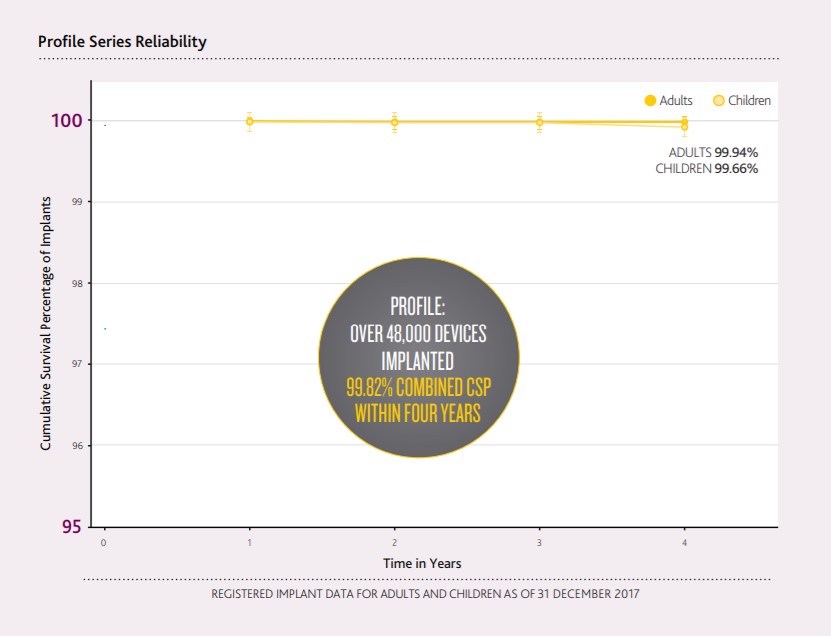Guest author: Wade Colburn
Of all the different factors in counseling your patient on a cochlear implant, the reliability of the implant is likely one factor that comes to mind. Once a patient commits to a cochlear implant, it is important to know that a reliable and properly functioning implant is the basis for hearing. Furthermore, a reliable implant can reduce the need for a possible revision in the future. All manufacturers claim to have the most reliable 1,2,3 implants, but this can’t be the case.
Let’s take a closer look at what goes in to reliability reporting. Reliability is measured as Cumulative Survival Percentage (CSP), which is the probability of survival of a device within a given time period, and Cumulative Failure Percentage (CFP), which is the probability of failure of a device within a given time period.
Reliability reporting is done each and every year and should be reported according to the European and Global Consensus Statement on Cochlear Implant Failures and Explantations1. This consensus detailed how device failures and reliability should be reported and established the seven principles of best practice reporting.
In the latest reports of each cochlear implant manufacturer, the CSP was reported as follows: Cochlear TM Profile Series – 99.82% within 4 years 2, Med-El Synchrony Series – 98.16% within 3 years 3, Advanced Bionics HiRes 90K Advantage – 99.29% within 5 years 4. While this may seem like a small percentage difference, the fact is these numbers result in the following likelihood of failure:
- Cochlear Profile: 1 in 556 devices fail within 4 years.
- Advanced Bionic HiRes 90K Advantage: 1 in 141 devices fail within 5 years
- MED-EL Synchrony: 1 in 55 devices fail within 3 years
This way of looking at reliability is powerful and the reason Cochlear stands behind having the best reliability in the industry establishing itself as the most chosen manufacturer in the world.
The difference in CSP seems very small (<1%), but it can translate to a big difference with tremendous impact to patients. To establish this evidence supporting Cochlear as #1 in implant reliability, the following calculations were made:
- Convert failure rate (CFP) based on Cumulative Survival Percentage (CSP)
- Cochlear Profile (4 Years) 99.82% (CSP) = 0.18% failure rate
- AB HiRes 90K (5 Years) 99.29% (CSP) = 0.71% Failure Rate
- MedEl Synchrony (3 Years) 98.16% (CSP) = 1.84% Failure Rate
- Based on this failure rate, we establish how many will have failed after 1000 implantations (1000 implants x failure rate):
- Cochlear Profile (4 Years) = 1000*.0018 = 1.8 Failures in 1000 Implants
- AB HiRes 90K (5 Years)= 1000*.0071 = 7.1 Failures in 1000 Implants
- MedEl Synchrony (3 Years) = 1000*.0184 = 18.4 Failures in 1000 Implants
- Last we establish the number of implants for every failure: 1000/ # of Failures per 1000
- Cochlear Profile (4 Years) = 1000/ 1.8 = 1 in 556 within 4 years
- AB HiRes 90K= 1000/7.1 = 1 in 141 within 5 years
- MedEl Synchrony = 1000/18.4 = 1 in 55 within 3 years
Understanding reliability is essential to making the best decision for your patients. To learn more about reliability reporting at Cochlear and see the full Reliability report.
About our guest author:
Wade is the Product Manager for Cochlear Implant product portfolio within Cochlear Americas. Wade’s responsibilities include product positioning and messaging, life-cycle management, new product launches and surgical support and training. Wade has recently joined Cochlear, but comes from an engineering background with the medical device field, including previous otology experience.
References:
-
European Consensus Statement on Cochlear Implant Failures and Explantations. Otol Neurotol. 26: 1097-1099, 2005.
-
Cochlear Nucleus Implant Reliability Report. Volume 16 | December 2017. D1335113. Cochlear Ltd; 2018
-
Hearing Implant Reliability Reporting | MED-EL [Internet]. Medel.com 2018 [cited 15 Oct 2018] Available from: https://www.medel.com/us/reliability-reporting/
-
2018 Global Implant Reliability Report. 027-N025-02 Rev B. Advanced Bionics AG and affiliates; 2018.






